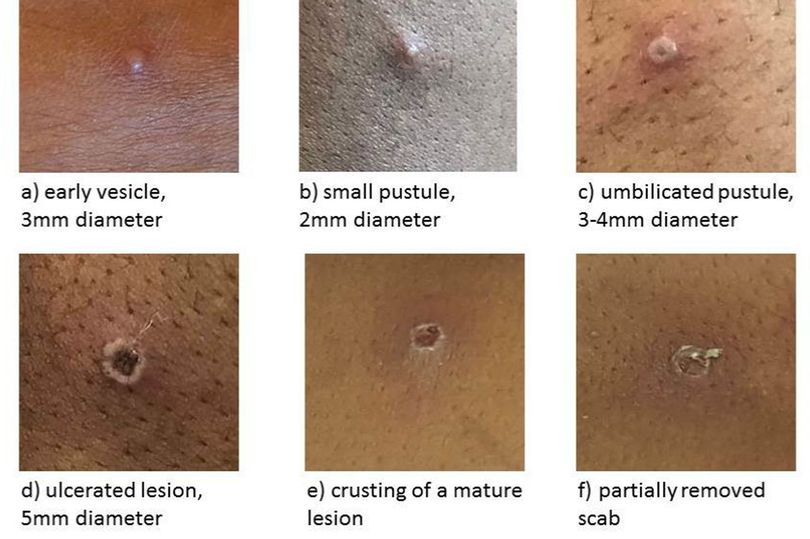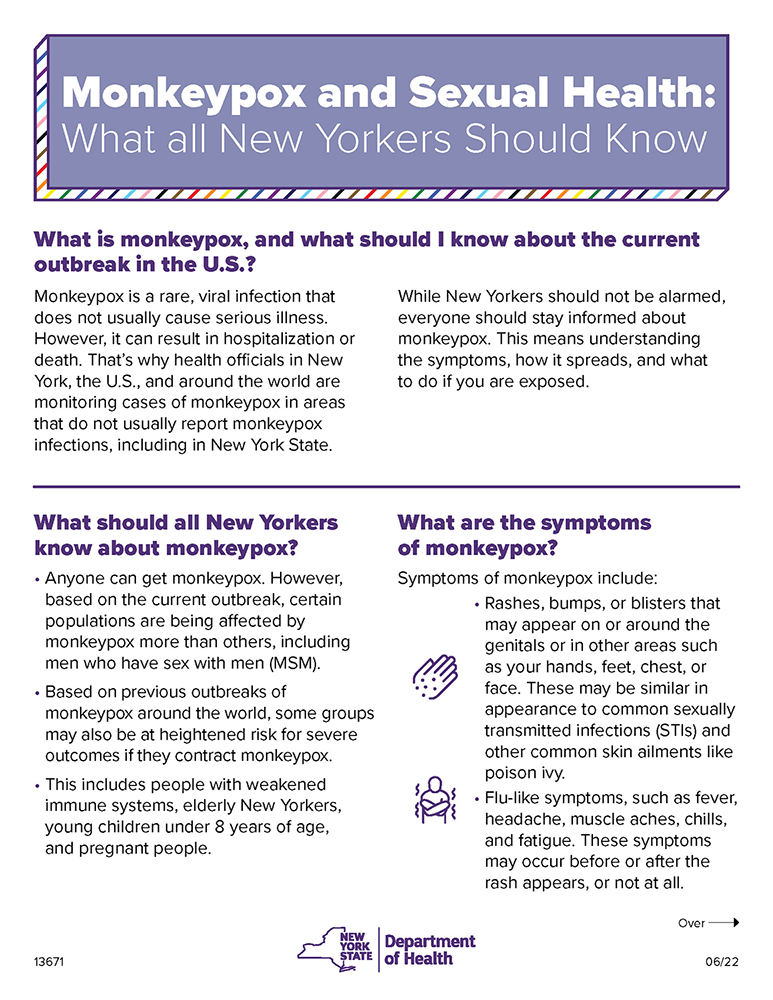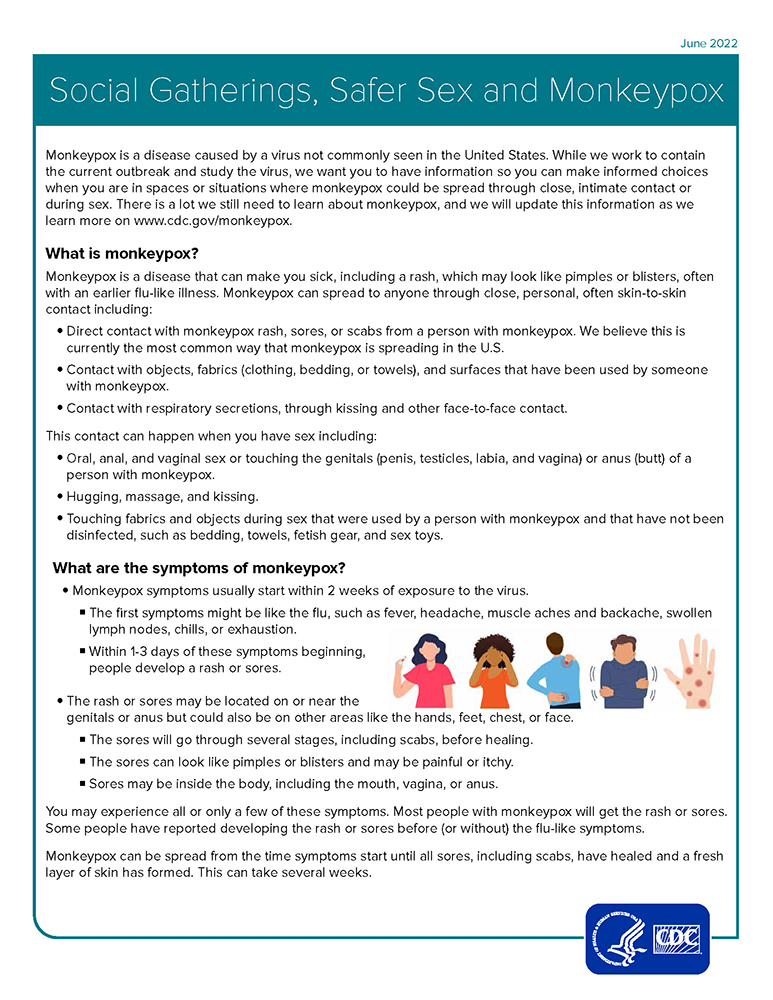
* NEW APPOINTMENTS AVAILABLE *
Click Here to Schedule an Appointment
IS IT DEADLY?
The symptoms can be extremely painful and may cause permanent scarring, however the current outbreak is of the West African strain which is rarely fatal. People with weakened immune systems, children, with a history of eczema and women who are pregnant or breastfeeding can get seriously ill or die.
SYMPTOMS
Symptoms usually start seven to 14 days after exposure, but in some cases they may not appear for up to 21 days.
- Fever
- Headache
- Muscle aches and backache
- Swollen lymph nodes
- Chills
- Exhaustion
- A rash that can look like pimples or blisters that appears on the face, inside the mouth, and on other parts of the body, like the hands, feet, chest, genitals, or anus.
- The rash goes through different stages before healing completely. The illness typically lasts 2-4 weeks

HOW IS IT SPREAD?
Monkeypox spreads in different ways. The virus can spread from person-to-person through direct contact with the infectious rash, scabs, or body fluids. It also can be spread by respiratory secretions during prolonged, face-to-face contact, or during intimate physical contact, such as kissing, cuddling, or sex. In addition, pregnant people can spread the virus to their fetus through the placenta.
- IT CAN BE SPREAD THROUGH SEX
- Oral, anal, and vaginal sex, or touching the genitals or anus of a person with monkeypox
- Hugging, massage, kissing or talking closely
- Touching fabrics, shared surfaces, and objects, such as bedding, towels and sex toys, that were used by a person with monkeypox
HOW TO PREVENT SPREADING?
Monkeypox can spread from the time symptoms start until the rash has fully healed and a fresh layer of skin has formed. The illness typically lasts 2-4 weeks.
To protect others while you are sick:
- Avoid sex or being intimate with anyone until you have been checked by a provider.
- Stay home and separate from other people in your household.
- If you cannot fully separate from others in your household, wear a face mask and avoid physical contact. Wear clothing that covers your lesions when in shared spaces.
- If you must leave home for essential needs or medical care, cover your rash and lesions with clothing and wear a face mask.
- Do not share or let others touch your clothing, towels, bedding or utensils. Do not share a bed.
- Do not share dishes, food, drink or utensils. Wash dishes with warm water and soap or in a dishwasher.
- Wash your hands and clean shared surfaces, such as countertops and doorknobs, often. Household members should also wash their hands often, especially if they touch materials or surfaces that may have come in contact with lesions.
- If you or your partners are sick, especially if you or they have a new or unexpected rash or sore, do not have sex or close physical contact. Avoid clubs, parties or gatherings until you have talked to a health care provider.
- Wash your hands, sex toys and bedding before and after sex or other intimate activities.
- When making plans, consider the level of risk. Clubs, raves, saunas, sex parties and other places with skin-to-skin or face-to-face contact with many people may increase your risk of exposure.
People who do not have monkeypox symptoms cannot spread the virus to others.
PREVENTION
- Avoid close, skin to skin contact with the monkeypox rash.
- Do not touch the rash or scabs of person with monkeypox.
- Do not kiss, hug, cuddle or have sex with someone with monkeypox.
- Do not share eating utensils or cups.
- Do not handle or touch the bedding, towels, or clothing of a sick person.
- Wash your hands often with soap and water or use an alcohol-based hand sanitizer, especially after contact with sick people.
- Avoid anonymous sex and sex with multiple partners.
TREATMENTS / VACCINES
- There are no treatments specifically for monkeypox virus infections.
- Antivirals, such as tecovirimat (TPOXX), may be recommended for people who are more likely to get severely ill, like patients with weakened immune systems.
- The U.S. government has two stockpiled vaccines—JYNNEOS and ACAM2000—that can prevent monkeypox in people who have been exposed to the virus but widespread vaccinations are not yet recommended.

 Click For Updates from NYC DOH
Click For Updates from NYC DOH
___________________________
TEMPORARY NYC VACCINE CLINICS
CHELSEA SEXUAL HEALTH CLINIC
303 9th Ave in Manhattan
CENTRAL HARLEM SEXUAL HEALTH CLINIC
2238 Fifth Ave in Manhattan
CORONA SEXUAL HEALTH CLINIC
34-33 Junction Boulevard, Queens
You must be eligible to receive a vaccine and appointments are required. The clinics are open on Mondays, Tuesdays, Thursdays, Fridays, and Sundays from 11 am to 7 pm. We recommend calling to confirm, as these days/hours are subject to change.
___________________________

Monkeypox and Sexual Health:
What all New Yorkers Should Know
___________________________

CDC: Social Gatherings, Safer Sex and Monkeypox
___________________________
If you believe you have been exposed, talk to your medical provider. If you do not have one, call 311.
Eligible New Yorkers who may have been recently exposed to monkeypox can get the JYNNEOSTM vaccine. This vaccine has been approved by the FDA for the prevention of monkeypox in people ages 18 and older. Getting vaccinated after a recent exposure reduces the chance of you getting monkeypox, and it can reduce symptoms if you do get it. You must take two doses of the vaccine, four weeks apart.
